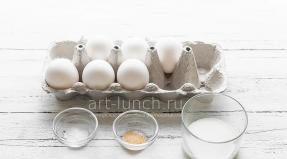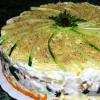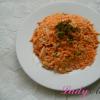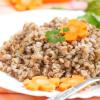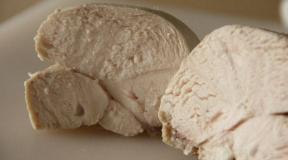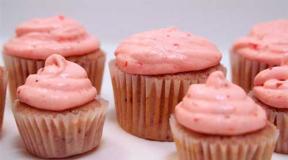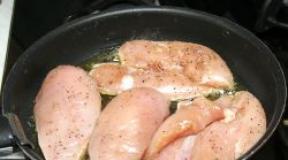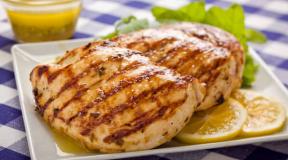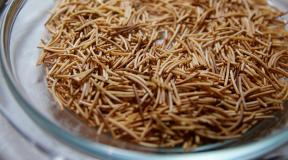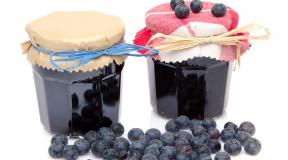How much water can you drink per day maximum. When is the right time to worry about your health? Why you can not drink water quickly, but you can take small sips
The recommendation to drink two liters clean water per day (about eight glasses) can often be heard from both ordinary people and professional fitness trainers or even nutritionists. Most firmly believe that the use a large number drinking water - which must be performed by default.
Mobile applications for counting glasses of water drunk per day inspire even more confidence in people that this recommendation is an undeniable truth and a long-known scientific truth. However, everything is not so simple, and modern nutritionists confidently say that for health it is not at all necessary to forcibly pour additional liquid into oneself.
What foods improve metabolism and? Practical tips for optimizing metabolic processes.
The norm of water per day: scientific data
The statement that for health a person needs to drink at least two liters of pure water daily (excluding tea, coffee, juices and other drinks) - or 8 glasses - was made more than 70 years ago, in 1945, by doctors of the American government organization Food and Nutrition Board. It is this recommendation that underlies all the advice to drink two liters of water a day.
At that time, doctors and nutritionists believed that each kilocalorie of food eaten for digestion and successful assimilation by the body requires about 1 gram of water - given that it is about 2000 kcal, that’s exactly the same two liters of water per day that you literally have to drink. to stay healthy.
However, it is important that in 2004 National Academy of Sciences's Institute of Medicine(successor of FNB) decided to revise and add clarifying details to existing recommendation. The organization stated that for proper metabolism, adult males need to drink between 3 and 3.7 liters of water per day and women between 2 and 2.7 liters (1) .
In addition, a fundamental amendment was made to the recommendation. Scientists emphasized separately that not only pure water is meant, but also any other liquid, including that consumed in the composition of products. It was also noted that the daily need for water in most cases is covered by fruits, food, juices and other drinks.
How much water should you drink per day:
How much water really need body?
It is also interesting that numerous scientific studies have shown that there is no connection between the daily additional consumption of two to three liters of clean drinking water and the improvement (or deterioration) of kidney or liver function, as well as the cure or development of any chronic diseases(2) . In other words, you don't need to drink a lot of water.
Without a doubt, if you are running a marathon distance in the heat or actively taking it, your body really needs additional fluid - however, it is impossible to say for sure exactly how many liters or glasses of pure water per day you should drink in excess of the recommended amount.
Water - a dangerous dose for health
As such, there is simply no maximum daily intake of water. Only a few fatal cases of voluntary overdose of drinking water are known. In one of these cases, while using a synthetic drug, a person lost the feeling of fullness, as a result of which he drank more than 6 liters of water in a short period, which caused death (3) .
In fact, healthy kidneys can process no more than 1 liter of water per hour. Theoretically, if you persist in drinking significantly more water, however, you will not spend the liquid by increased sweating, the body will begin to “pump” ordinary cells with water, which will be able to harm health or lead to death. However, this is difficult to imagine in reality.
How much caffeine is in or a glass of tea? Is it really in instant coffee is it less?
How much water do you need to lose weight?
As FitSeven mentioned above, the average daily water requirement is approximately 3-3.7 liters for men and 2-2.7 liters for women. The real figure for how much water you should drink depends on many factors that are impossible to calculate - if you sunbathe all day on the beach or do active fitness for weight loss, you really need more water.
However, even in this case, there is no point in separately calculating how much water you need to drink. If you feel thirsty after, during which you lost a lot of fluid with sweat, drink. But don't believe that the more water you drink (or the more you sweat) the faster you'll lose fat - that's just not true.
Should I drink water before meals?
Another “scientific” recommendation says that in order to lose weight, you must drink a glass of warm water before eating. There is a logic to this, because by physically filling the stomach, this could theoretically help you eat less food and feel full faster. But it is difficult to call this recommendation a truly confirmed scientific fact.
The human body is quite complex, and it is impossible to “deceive” it by replacing a full meal with water. At the same time, the opposite rule often works - many liquids do not improve digestion at all, but rather worsen it. First of all, this applies to ice and strongly brewed hot teas taken with food.
***
The recommendation to drink two liters of pure water a day (or 8 glasses) has no evidence base and has long been refuted by a scientific organization that made this recommendation in the middle of the last century. Additional water is needed by the body only when the body is heavily losing fluid, but this need is difficult to regulate in tables.
Scientific sources:
- Dietary Reference Intakes: Water, Potassium, Sodium, Chloride, and Sulfate,
- “Drink at Least 8 Glasses of Water a Day” – Really?,
- Strange but True: Drinking Too Much Water Can Kill,
In short: Calculate your rate of alcohol consumption is real. How much alcohol can you drink so that there is no hangover, in order to maintain your health, so as not to be afraid of alcoholism - that's all different norms, and you can calculate the one that suits you using the tips from this article.
I drink a little more than I can, but less than I want
When I drink, I don't sing - I don't sing, I scream
Group "Spleen"
How much alcohol can you drink? From what quantity do you run the risk of planting a liver? How to limit yourself so as not to go into a binge, not to become addicted to drinking? Is it possible to calculate the dose from which you will not suffer a hangover in the morning?
Calculate optimal rate drinking alcohol is real. Answers will vary for different people: depending on their weight, health status, other related factors. In this article, you will learn how to calculate exactly your alcohol rate depending on your goals: whether you want to protect yourself from alcoholism, whether you want to drink without a hangover, or take care of your own health first of all.
How much alcohol can you drink without harm to the body
Vodka
Beer
Wine



Infographics. How to find out your alcohol limit.
The most alcohol-sensitive organ is the brain, for which the toxicity threshold for pure alcohol is only 19 g per day (60 ml of vodka). With regular alcohol consumption, the destruction of the brain is irreversible, since the restoration of the neural network does not have time to complete before the new loss of brain cells.
Other organs damaged by alcohol (liver, kidneys, pancreas, lungs and eyes) recover much more efficiently than the brain, only for this you need to drink in moderation and give these organs time to recover. The fact is that there is a limit to the ability of a healthy person to process alcohol. For an average person weighing 70 kg, this limit is 170 g per day (538 ml of vodka). After such a dose, it is necessary to rest from alcohol for at least 8 days, giving the body time to recover. Then the organs affected by the negative impact will be able to return to full working capacity and will not continue to collapse during the next booze.
How to calculate your hangover-free alcohol rate
You can calculate for yourself the dose of alcohol that allows you to completely avoid a hangover, according to the following formula:
1.5 ml of pure alcohol per kilogram of body weight.
In terms of vodka, this is 3.75 ml per kilogram of body weight. For example, if a person weighs 70 kg, then at the table it is better for him to limit himself to 262 ml of vodka at a single dose, and when taken within 4-5 hours, the dose can be increased to 327 ml.
For your convenience, here is a table with ready-made calculations of how much and what you can drink if you don’t want to suffer from a hangover. All doses are calculated for people with different weight body (from 50 to 90 kg). Doses of alcohol are given in milliliters.
Keep in mind that recommended doses decrease with age because the body no longer processes alcohol as efficiently. In addition, the more complex the composition of the drink, the more difficult it is for the body to cope with it. Therefore, a hangover from a 40-degree cognac will be harder than from the same dose of vodka.
The article was last updated: 2019-01-19
Didn't find what you were looking for?
Free guide to knowledge
Subscribe to the newsletter. We will tell you how to drink and eat so as not to harm your health. Best Tips from the experts of the site, which is read by more than 200,000 people every month. Stop ruining your health and join us!
And fertility. Opinions even among physicians are directly opposite. Let's try to figure out how much water you need to drink per day.
Without water, neither people, nor animals, nor plants can live. Not every person will live without food for a month, and without water for a maximum of a week (with elevated temperature body and nothing more three days). The total amount of water in human body depending on its weight and age, it is from 55 to 78% of body weight, our brain is 80% water, in the human embryo it is all 97% water.
Water has always been treated as a kind of miracle, at all times it was worshiped, idolized and extolled as a shrine.
However, recently, thanks to the research of scientists, the availability of theories and practices of other peoples and traditions, people began to talk about water as a panacea. Calls to drink as much water as possible, namely water, and not any other liquid, are heard everywhere, there are opinions of drinking water in a volume of 2-3 or more liters per day, bringing it to five.
- the weight of a person;
- his physical activity;
- ambient temperature;
- calorie intake;
- individual physiology of each;
- state of health
- the age of the person.
One call for all: drink water and you will be healthy! The notorious 8 glasses, and somewhere 10 or even 12 do not leave the Internet pages about health.
Where did the call for 2-3 liters of water come from?
- For the first time, such recommendations for quantity began to appear with the advent of the theory of vegetarian and even raw food nutrition, from people adhering to alternative methods of nutrition. But there the key word is WATER, that is, a call for the predominance of water in the diet, replacing tea, coffee, compotes with it.
- It is believed that drinking water manufacturers came up with this norm in an effort to increase sales.
- Another version: nutritionists involved in the problem of weight loss - losing weight, began to focus on increasing water intake.
And most likely all three factors coincided here and the myth about the volume of 2-3 liters of water began to be imposed on everyone.
Let's try to figure out whether the immense consumption of simple, even absolutely pure water is so useful and important for everyone. I foresee objections and even anger from H2O supporters! 🙂 But let's just give arguments, scientific facts and own experience.
What is useful water for the body
The call to absorb water appeared during the craze healthy eating, diets and weight loss. It has been established that ordinary raw water speeds up the metabolism in the body, thereby enhancing the process of burning calories. The process starts as early as 10 minutes after drinking water and reaches its peak in half an hour.
Nutritionists advise: 2 glasses of water drunk before breakfast on an empty stomach are good for the body. One cannot disagree with this, the morning portion of water is indeed:
- washes the stomach, intestines, cleanses their walls,
- removes toxins, improves stool, starts digestion processes;
- increases the energy of the body.
In between meals, 2 glasses - similar recommendations are given for those who are concerned about harmony. The total amount of water 6-8 glasses a day is recommended for people who want to lose weight. And girls - beauties, striving to be perfectly slender, turn off the water for days on end, trying to reduce their appetite. This is extremely harmful and even dangerous to health and can even slow down the process of weight loss. After all, it is the excess water accumulated by the body that slows down the process of losing weight. Everyone knows how after a bath, with p O that water comes out and weight is reduced. But we drink water again and it is absorbed by the tissues and the weight returns to its original place. Because here everyone experiments on himself.
Why is raw water so beneficial? The fact is that when, its intercellular structure becomes different from the cell membrane of the blood, which slows down its absorption by the body.
In addition, the use of only boiled water leads to the leaching of salts and minerals from the body. If you drink boiled water, then immediately after cooling it is still warm and in no case the one that has cooled down for a long time.
How much water to drink in liters?
Where did the conversation about the volume of water necessary for the body of two to three liters per day come from?


It is known that the daily recommended calorie content for an average adult is 2000-2200 kilocalories. During scientific research It was found that for every thousand kilocalories consumed with food, you need to drink about one liter of liquid to ensure the work of all important processes in the body. This is where the call to drink two liters of water came from.
BUT! For some reason it doesn't count. the volume of water obtained with coffee, tea, compote, juice, not to mention soup, porridge, salad and even bread, which also contain a decent amount of water. How much is used per day fruits and vegetables? Yes, it is possible that all drinks are perceived by the body as biochemistry - food and are not the purest water that our cells need so much. But this is also a liquid, a load on the organs that process and filter water. And this fact cannot be ignored!
But you must admit that even the most purified water, getting into the oral cavity during the day after eating, then getting into the stomach, mixes with food and becomes ..... the same biochemistry that tea suffers from. compote, coffee. So what are we talking about?
It is believed that water with food is even absorbed better and faster. Juice, soup, tea, compote enrich the blood with useful trace elements. Yes, and drinking such a liquid is easier, more pleasant and maintains water exchange than pushing clean water into oneself.
Therefore, if you, following the call, decide to drink the recommended 2-2.5 liters of plain water daily, you need to simultaneously exclude all liquids from glasses from your diet. The rest of the necessary fluid will enter the body with food. Is everyone ready to do it? I don't think... and is it necessary?
A separate conversation about the vegetables and fruits eaten, containing in excess the very thing to eat structured water beneficial to the body. So cucumbers are 95% water, slightly less in tomatoes, and - 90%. Lots of water in fruits. Talk about the content in these gifts of nature of an unprecedented amount beneficial trace elements, acids and other the most useful substances, which enter the body only thanks to these products, there is no need.
Therefore, the call for the required volume of plain water for the body to be 2 liters, not to mention three liters, is a myth!
It is enough to drink a couple of three or four glasses a day raw water(everything is individual), plus the liquid that is contained in fruits, vegetables and all products. If brewed correctly green tea, not boiling water, but water brought to a boil and slightly cooled - then the benefits of this drink are as great as berry fruit drinks, freshly prepared fruit, berry and vegetable juices, fresh juices, cocktails.
It is tasty, healthy and you don’t have to torture yourself with an exhausting “water hole”. You can not dump water from coffee, tea, milk, kefir and other drinks from the scales if you drink them.
Excess water in the body
 I will surprise many with the message that excess water can be the cause of death. This is how the life of a 28-year-old American woman ended - the winner of the competition for high-speed water consumption due to excess water in the body. How much water this lady drank is a mystery, but obviously not a little. Similarly, two recruits of the American army ended their lives after a grueling workout, they drank several liters at once plain water. In both cases, the cause was water intoxication of the body or the so-called drinking disease.
I will surprise many with the message that excess water can be the cause of death. This is how the life of a 28-year-old American woman ended - the winner of the competition for high-speed water consumption due to excess water in the body. How much water this lady drank is a mystery, but obviously not a little. Similarly, two recruits of the American army ended their lives after a grueling workout, they drank several liters at once plain water. In both cases, the cause was water intoxication of the body or the so-called drinking disease.
Water, not having time to be filtered by the kidneys, accumulates in the intercellular fluid, in excess enters other organs, which swell and cause external edema. The brain, enclosed in the bone box of the skull, suffers especially, its cells swell, which leads to death.
Of course, such cases are rare, but it is important to remember that even healthy body able to pass through the kidneys only 800-1000 ml of fluid per hour. So passionate beer lovers who can drink more than one liter of drink should be especially careful. It is better to drink liquid in small portions during the day before or after meals.
Water and beauty The effect of water on skin condition
Until now, the relationship between the condition of the skin and the amount of water drunk has not been proven, just as the need to consume exactly 2-3 liters of water per day has not been proven. Although there are some improvements in skin turgor in people who previously did not drink the right amount of water, and now began to make up for the deficiency. In people with a normal drinking regime, the indicators did not change.
Any beautician-doctor will say that only a small percentage of the water we drink ends up in the skin. First of all, the drunk water is sent to the intestines, then to the blood and kidneys - the remnants reach the skin.
Of course, you need to drink water. But to rely entirely on the fact that she and only she will save you from acne, wrinkles and other things is wrong. It is important to take care of your skin, eat right, exercise, walk a lot.
Drinking a lot of water is bad
What's wrong with too much water? Like its deficiency, its excess is fraught with the following consequences:
- An excess of water overloads the heart;
- Makes the kidneys work hard;
- Increases protein breakdown;
- Increases perspiration;
- Excess water flushes out of the body the right salts, thereby disturbing the salt balance
- Busting with water makes digestion difficult, diluting gastric juice, which allows infections and rods to freely enter the bloodstream. That is why it is so important to take any liquid only half an hour after eating.
Drinking more than 1.5 liters of water is permissible in the following cases:
- conditions,
- v extreme conditions: in case of poisoning, air travel, urinary tract infections, urolithiasis.
In other cases, it is good to drink clean water in the morning on an empty stomach, as it occurs and in between meals.
Who needs to limit their water intake
- People suffering from high blood pressure, it is important to control the amount of alcohol consumed;
- Those who have heart disease, kidney disease, it is generally unacceptable to talk about 2 liters of water, on the contrary, consumption should be limited.
- It is especially important for pregnant women to maintain water balance.
As you can see, there are supporters of water without restrictions and there are for compliance with the norm. To drink or not to drink water and in what quantity, first of all, it is important to listen to your body. If there is a need - drink water for health. If you don't want to, you don't have to force it into yourself.
It is known that thirst is formed by special hormones in the body, each has its own. That is why there are water drinkers and those who by nature do not reach for water.
No one is surprised that there are moisture-loving and dry-resistant plants. Try to fill the flower - you will see how its roots begin to rot. Of course, a person will not rot from excess water, but will there be any benefit from excess water? This is a question.
Calculation of the required amount of water for the body
for adults up to 50 years old 35-40 ml per 1 kg of body weight,
for people over 50 30-35 ml per 1 kg of body weight.
On average, we get 0.8 -1.2 liters of liquid from the water we drink, about a liter - from the foods we eat, another 0.4 liters of water is independently formed in the body.
Theory Academician V. Tolkachev, indicates that abundant fluid intake is characteristic of certain types of people and limiting such people in the amount of alcohol they drink is dangerous for their health, as well as forcing those who are not predisposed to this physiologically and psychologically to drink heavily.
Academician Nikolai Amosov in his health system, he claims that the body needs 2-3 liters of liquid (not necessarily water), you need to take into account the volume, taking into account vegetables and fruits, and the professor himself paid special tribute to tea. At the same time, he agreed that each person has his own need for water and urged to listen to his body.
Doctor S. Bubnovsky- doctor of medical sciences, a professor who has cured hundreds of patients from joint disease, calls for drinking up to 3 liters of liquid, but this volume includes green tea, natural kvass, fruit juices, vegetables.
Popular cardiologist, Chief Physician of the City Clinical Hospital named after M.E. Zhadkevich, Moscow, host of the TV program "About the most important thing" A. L. Myasnikov is of the same opinion:
“To drink or not to drink?! It is necessary to spin a simple, like, theme like that! Here, in fact, simple arithmetic, like the law of conservation of energy: “How much of something has decreased in one place, so much should be added in another place” ... You just need to follow your feeling of thirst - this is the best indicator of how much fluid you drink ... Therefore, you need to follow not the advice of "experts", but trust your thirst. If you do not spur it on with salt, then the body will reach an individual and correct level of water consumption,” the specialist explained.
Competing in the amount of alcohol you drink is fun, but not safe. Often such competitions end in the intensive care unit of the hospital and even in the cemetery. Interestingly, those who drank the most vodka were those who were not going to set a record, but simply lost control of themselves. With beer, the situation is different, training is needed there.
lethal dose alcohol concentration is considered to be 5 ppm units or more. Despite this, cases have been recorded in the world when people survived even with a higher concentration of alcohol in the blood. True, they were found in time and rendered medical care. Subsequently, the abundant amount of alcohol consumed had a negative impact on health.
Only in one of the three cases, the record was set by vodka, in the other two, nothing is known about the drink, but for ease of perception, the dose of alcohol drunk was transferred to vodka. Rating:
First place. On August 8, 2013, police found a 40-year-old unconscious man in a roadside ditch near the Polish town of Nowa Demba. At the hospital, it turned out that his blood contained an incredible dose of alcohol - 13.74 ppm.
The record holder was saved, but alcohol caused irreparable harm to his digestion, nervous and cardiovascular systems. What kind of alcohol the man drank is not reported. In terms of vodka, he drank 2.75 liters.
Second place. In 2004, in the Bulgarian city of Plovdiv, a car hit 67-year-old Petr Petrov. Arriving at the call, the doctors realized that grandfather was very drunk. But the analysis of his blood shocked: the breathalyzer showed 9.14 ppm.
Confident in the malfunction of their equipment, doctors repeated the test 5 more times, but the result did not change. At the same time, grandfather was conscious and clearly answered questions. He was immediately sent to intensive care. Later it turned out that in an hour and a half Peter Petrov drank about 2 liters of vodka. This is the case when an accident saved a person's life. If the Bulgarian had not been helped in time, he would definitely have died.
Third place. In 2003, an unconscious drunk man was found at a bus stop in Riga. His blood contained 7.22 ppm of alcohol (the equivalent of 1.5 liters of vodka). After treatment, he admitted that he drank himself unconscious because of a quarrel with his wife, while he did not remember the exact amount of alcohol he drank and even the drink itself.
Strong intoxication occurs at 2.5 ppm (0.5 liters of drunk vodka in 1-2 hours), even healthy people it is not recommended to exceed this dose.
 0.5 liters of vodka causes severe intoxication
0.5 liters of vodka causes severe intoxication beer records
In 1977, the Frenchman S.P. Carlisle drank 1 liter of beer in 1.3 seconds. In turn Czech chef Mider drank 10.5 liters in 3 minutes. But to achieve this grandiose result, he trained for several years for a long time, drinking 8 liters of beer a day. Young worship also has something to brag about 🙂
The largest brewery "Anheuser Bush Incorporated" is located in the USA (the city of St. Louis). It produces more than 11 billion liters of beer annually. Most small factory located in the Czech city of Pilsen. This museum exhibit can produce up to 30 liters of beer per year.
Right drinking regimen along with rational nutrition plays a lot important role in ensuring the normal functioning of the body. What kind of water is more useful to drink and how to do it correctly so as not to harm your health? Read about it below.
Water is a universal solvent. As part of the liquid component of blood, it is involved in the transport of oxygen, carbon dioxide, nutrients and waste products, thermoregulation and chemical processes in cells.
How much water should an adult, a pregnant woman, a newborn child, children drink per day per 1 kg of weight?
Scientists have calculated that the body of an adult male is 60% water, and female - 50%. For an adult:
- To maintain water balance, it is necessary to consume 1.5 - 2 liters of pure water per day.
- The physiological need in terms of 1 kg of adult weight is 30 ml of water daily.
During pregnancy water is involved not only in the metabolism of the mother's body, but also the unborn fetus. That's why doctors recommend:
- Drink 2.5 liters of drinking water per day.
- To prevent the occurrence of edema, it is necessary to reduce not the amount of fluid you drink, but salt, and this should be done throughout the pregnancy.
The doctor will help you establish the correct drinking regimen based on the results of the tests.
Inadequate fluid intake can affect the quality of amniotic fluid and the mother's body.
The amount consumed newborn baby water depends on the type of feeding.
- With artificial or mixed feeding, the norm should be supplemented by a baby from two weeks of age, while the norm of water he drinks during the day is 100 - 200 ml.
- At breastfeeding the baby needs to be supplemented from 3-4 months of age, as he drinks breast milk 90% consists of water. 50-70 ml of drinking water per day is enough for the baby.
Important: the opinion that a breastfed baby does not need supplementation is erroneous. Remember that mother's milk is food, not drink!
Keeping the water balance in the body children is the key to their health. Drinking enough liquid of proper quality will help to avoid problems with growing teeth, gums, joints, kidneys.
- Children need to drink 1-1.5 liters of pure water per day
- The physiological need for water in children is 50 ml per 1 kg of body weight.
What happens if you drink too much water - is it good or bad: consequences
Despite all the benefits of clean drinking water, with a large amount of consumption, it can harm the body.
- When drinking large amounts of water at a time, vomiting occurs. This property is used when washing the stomach in case of poisoning, but in normal conditions such a phenomenon brings only discomfort.
- The risk of edema increases, which can even affect the brain and lungs.
- Together with excess water salts and minerals are washed out of the body, the water-salt balance is disturbed, which can lead to a decrease in muscle and mental activity and even convulsions.
- The body will try to get rid of large amounts of fluid through diarrhea.
Everything is poison and everything is medicine. And only the dose makes a medicine a poison, and a poison a medicine. (Paracelsus)

Is it bad for the kidneys to drink too much water?
There is an opinion among doctors that the best prevention kidney disease is their continuous work. In order not to suffer urolithiasis or inflammation of the urinary tract, you need to use enough fluids per day (at least 2 liters). This volume must be reduced if kidney disease is already present.
At overuse water, the kidneys work in an enhanced mode, and it can be assumed that over time, such overloads will begin to affect their health and performance. However, to date, a reliable relationship between kidney disease and a large amount of fluid drunk has not been established.
Situations in which you need to drink more water
In some cases, the amount of fluid consumed can be increased to 3 liters per day.
- Physical exercise
- Vomiting and diarrhea
- increased urination
- Increased sweating
- Body burns
- Poisoning and intoxication of the body
- SARS, influenza
What happens if you drink too little water - is it good or bad: signs of dehydration, consequences
A person can live without food for more than a month, but without water, only 3-4 days. Reducing the level of fluid in the body is extremely dangerous for all body systems. Are you suffering from a lack of water in your lungs and medium degree, if:
- You have dry skin. This manifests itself in peeling, a tendency to chapping, the appearance of deep wrinkles and other signs of premature aging.
- There are problems with digestion - heartburn, indigestion, frequent constipation.
- There is thirst and dryness in the mouth and eyes, as the mucous membranes dry up.
- You are sick longer, because the viscous blood does not have time to transport the toxins formed during the illness to the organs of their excretion.
- You experience joint pain due to the fact that the amount of fluid in the joint bag decreases, and the bones begin to rub against each other.
- You often get headaches, especially at the end of the day. So the brain reacts to a decrease in the level of water in its composition.
- The feeling of hunger occurs more often than usual. The body sends hunger signals in order to replenish fluid reserves along with the food taken.
Severe dehydration requires prompt medical attention and has the following symptoms:
- rapid breathing and heartbeat
- elevated body temperature
- sunken fontanel in infants
- confusion and distraction in children and adults
- lack of sweat and tears
- dark urine in small amounts
- strong feeling of thirst
- low blood pressure
Such dehydration is rare, but requires close treatment in a hospital setting.
What water is better to drink: cold or hot?
Neither cold nor hot. Cold water causes spasms of the walls of the digestive tract and stomach, in addition, the body still “warms up” the incoming fluid to body temperature. Hot water, boiling water - not very pleasant palatability, and can burn the mucous membrane.
Drink right warm water warmed up to room temperature or human body temperature.
Why do Chinese people drink hot water?
There is no single correct answer to this question, however, there are versions that:
- According to traditional Chinese medicine, drinking cold drinks can disrupt the flow of yin and yang energy in the body.
- Heated water helps better assimilation food, especially fatty, because fat dissolves easily in boiling water.
- A more earthy version - the water is heated for hygienic reasons to kill pathogens.
- The use of pure boiling water is a feature of the mentality, a tradition developed over the centuries that does not have a specific subtext.
Is it good to drink water on an empty stomach in the morning, how much water to drink, cold or hot?
According to doctors, the ideal start to the day should necessarily include drinking water on an empty stomach. It should be warm water, comfortable for our body.
- Drinking water on an empty stomach washes the walls of the stomach, helping to cleanse it of undigested food debris.
- It stimulates the contraction of the walls of the digestive tract and thus has a mild laxative effect.
- The gastric juice is diluted and the feeling of morning heartburn disappears.
- Appetite decreases due to a feeling of fullness in the stomach.
To achieve such positive effects, it is enough to drink 1.5 - 2 glasses of warm water in the morning on an empty stomach.
Is it useful and how to drink water with lemon in the morning?
It will not be superfluous to add a slice of lemon or a teaspoon to warm water in the morning. lemon juice.
Lemon perfectly stimulates the immune system, invigorates, accelerates the elimination of toxins, enriches the body with vitamins.
In addition, it is known for its fat burning and antibacterial properties. You need to drink such homemade "lemonade" on an empty stomach, 20-30 minutes before a meal.
giving lemon water children need to be careful. sour juice can harm the delicate lining of the stomach of a child, and lemon can cause an unpredictable allergic reaction.
What water is better to drink: boiled or raw?
Heat treatment of the drink is one of the most effective means in the fight against pathogenic microbes. However, many people consider boiled water to be dead, useless, and harmful chlorine-containing compounds are formed during boiling. To avoid this, it is recommended to leave the water in an open container for a day before boiling, so that impurities such as chlorine, ammonia, etc., evaporate.
Raw water tastes better, but contains pathogens and disinfectant additives in the case of tap water. Before use, such water must be defended or passed through household filters.
What water is better to drink: mineral or plain?
plain water, tap water, is usually taken from terrestrial sources and has a variable composition. It depends on the amount of precipitation, season, remoteness of the reservoir from settlements and other factors. Not always chemical composition ordinary water satisfies the body's needs in the quality and quantity of microelements contained.
Mineral water has a constant chemical composition and is more saturated with inorganic trace elements. Depending on the content of salts in it, they distinguish:
- medical
- medical dining room
- dining room mineral water.
The first two types of water are taken as prescribed by a doctor and in limited quantities. Table mineral water (with a salt content of less than 1 g/l) can be drunk without restrictions and preferably from those sources that are geographically close to the place of your permanent residence.
Mineral water perfectly quenches thirst and restores the water-salt balance, however, it regular use requires significant financial outlay.
Is it possible to drink distilled water from a car shop, rain?
Distilled water from a car dealer It is intended for household purposes of servicing machines, for example, for washing radiators. Therefore, the container in which it is stored is not intended for food products, and you should not drink such water unless absolutely necessary.
Distilled water does not contain impurities and minerals, and it is impossible to replace absolutely all the water consumed with it.
Against, rainwater has an indefinite composition. It absorbs impurities contained in the atmosphere - dust, heavy metals, ammonia, pesticides. Drinking such water and even using it for domestic purposes is not recommended.
Can you drink sea water?
Sea water is the strongest poison for humans. The salts contained in it are enough to disable the kidneys and poison the body. After its assimilation, there is a sharp increase in the concentration of trace elements and salt in the blood, which leads to the outflow of fluid from the tissues, which leads to rapid dehydration of the body.
Can you drink tap water from a well?
tap water passes through several stages of purification and meets all sanitary and epidemiological standards before entering the pipes. However, in the water supply it is polluted a second time - with iron oxides, organics, bacteria, and the chlorine compounds contained in it can have negative impact on the health of allergy sufferers and asthmatics. Therefore, tap water that has not been boiled or cleaned with household filters is not recommended to drink.
Delicious and invigorating well water in the conditions of modern ecology most often contains a large amount of nitrates and fluorides. These compounds are difficult to remove and are of particular danger to child's body. The quality of water in different wells is different, and without laboratory tests it is difficult to establish whether it is possible to drink water from one or another source.
Is it possible to drink water with lime sediment?
The characteristic milky sediment of limestone after settling water indicates a significant content of calcium salts in it (increased hardness). Sanitary standards prohibit the use of such water for drinking purposes. Without additional softening and purification, regular drinking of water rich in limestone can lead to metabolic disorders and the formation of kidney stones.
Is it possible and useful to drink water at night?
The body consumes water in the process of metabolism even at night. To avoid feeling thirsty, half an hour before bedtime, it is recommended to drink half a glass of pure water, mineral water can be used. But you should stop drinking fluids before bed if:
- swelling in the morning
- restless sleep and frequent urge to urinate
Is it possible to drink water with high blood pressure, hypertension?
A diet for hypertensive patients must necessarily include a sufficient amount of liquid for an adult (at least 1.5 liters of water per day). Water in hypertension plays an important role in the body:
- Cleanses the walls of blood vessels from cholesterol plaques.
- Increases the volume of circulating blood, thus expanding the vessels and lowering blood pressure.
- Thins the blood, facilitating the work of the heart.
The amount of water consumed and its quality should be agreed with the attending physician.
How to drink water frozen in a bottle?
Frozen water has altered qualities. It is more conducive to cleansing and rejuvenation of the body, speeds up metabolism. To obtain it, settled water is poured into a bottle and placed in freezer, and then remove the opaque ice and the unfrozen part.
- At first, it is recommended to drink no more than 100 ml of frozen water per day in order to induce addiction.
- Then you can drink up to 1.5 liters of frozen water per day. This volume must be divided by 4 - 5 times and in medicinal purposes drink 30 minutes before meals.

How to drink water for weight loss?
Proper drinking regimen will help not only get rid of extra pounds, but also to keep the achieved result.
During the day you need to drink 8-12 glasses of water.
Try to stick to an approximate schedule for drinking water:
- In the morning on an empty stomach, at least half an hour before breakfast.
- During the day, 30 minutes before meals and 2-3 hours after meals.
- Between meals, focusing on the feeling of thirst.
- Small amount of water before bed.
In this case, water will help get rid of a false feeling of hunger, reduce the amount of food consumed, cleanse the body of toxins and toxins.
How to drink water in the heat and is it possible to drink cold water?
V hot weather thirst is felt stronger, and you want to drink as many cold refreshing drinks as possible.
The amount of water drunk on a hot day should be increased by 0.5 - 1 liter from the norm. Thus, an adult needs 2.5 -3 liters of fluid to maintain the water-salt balance.

Choose the right water temperature. Do not abuse cold drinks- it is fraught colds and angina. Ice water causes vasospasm, is absorbed more slowly and quenches thirst worse.
It is much more effective to drink warm or even hot water to speed up metabolism, increase perspiration, and thus cool your body naturally.
Is it good to drink a lot of water at a temperature?
- Water is additionally consumed for increased sweating and rapid breathing
- The liquid helps the body cope with intoxication, removing the products of the activity of viruses, bacteria and toxins from the body.
You can drink instead of water herbal teas with the addition of raspberries and rose hips.
How long after a meal can you drink water and why not with meals?
The tradition of drinking food while eating makes digestion difficult, since the incoming water dilutes the gastric juice and takes the necessary enzymes out of the stomach. For the same reasons, you should not drink water immediately after eating.
It would be correct to drink a glass of clean water half an hour before a meal and 0.5 - 4 hours after a meal.
- 30 minutes after eating fruit
- 1 hour after vegetables
- 2 hours after a carbohydrate meal
- 4 hours after meat products.
How long after a workout can you drink water and why can't you drink during a workout?
It is worth refraining from drinking water during training, so as not to create a feeling of fullness in the stomach and avoid discomfort during active exertion. In addition, an athlete who uncontrollably drinks water during exercise to quench increased thirst is at risk of water poisoning.
- You can drink water after physical activity, every 15 minutes, 150-200 ml. The total amount of liquid drunk should not exceed 1 liter.
- Drink 1-2 glasses of pure water half an hour before your workout to replenish your body's fluid stores and keep you from getting thirsty during exercise.

Why can't you drink water quickly, but can you take small sips?
Drinking water in one gulp puts a sharp strain on the kidneys and digestive tract. Not having time to assimilate, it is largely excreted from the body without being absorbed.
On the contrary, water, drunk in sips, is completely absorbed and perfectly quenches thirst.
Hold drinking water in the mouth before swallowing it. This will moisturize the oral mucosa and "deceive" the receptors that signal thirst, creating the effect of drinking a large amount of liquid.
Why can't you drink water after melon, corn?
To avoid unpleasant effects from the gastrointestinal tract, do not drink melon and corn with water. This will lead to increased flatulence, colic and even diarrhea. For the same reasons, it is not recommended to eat them on an empty stomach.
Why can't you drink water after surgery, anesthesia?
The postoperative condition is accompanied by intense thirst, but doctors do not allow drinking water after surgery and anesthesia.
- The incoming water against the background of general weakness provokes nausea and vomiting, and vomit can enter the respiratory tract and cause pneumonia.
- In the case of abdominal surgery, the drunk liquid puts pressure on the walls of the gastrointestinal tract and the sutures.
Drinking water is allowed only 2 hours after anesthesia.

